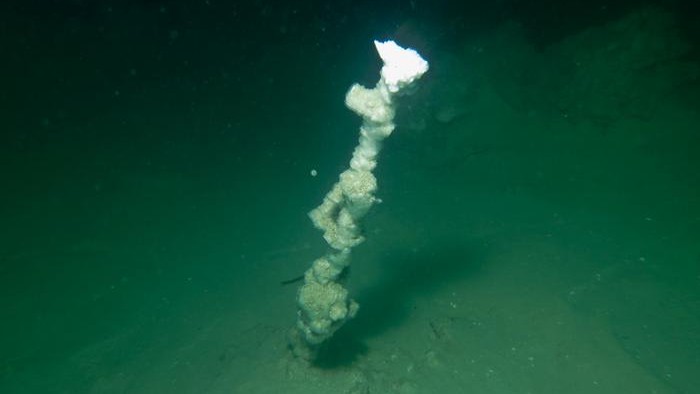
Scientists have discovered "white smokers" — towering salt "chimneys" spewing clouds of shimmering fluid — on the bottom of the Dead Sea. And they appear to be harbingers of destruction.
The submarine pillars, which reach up to 23 feet (7 meters) in height, could serve as an early warning of life-threatening sinkholes, which are common in the area.
"To date, no one can predict where the next sinkholes will occur," Christian Siebert, a hydroecologist at the Helmholtz Center for Environmental Research in Germany who led the study, said in a statement. "This makes the white smokers an outstanding forecasting tool for locating areas that are at risk of collapse in the near future."
The Dead Sea is a landlocked salt lake that borders Jordan, Israel and the West Bank. Famed for its salinity, the Dead Sea is almost 10 times saltier than the ocean, and it's getting saltier.
Related: 14 of the deepest sinkholes on Earth
For the past 50 years, the Dead Sea has been shrinking rapidly due to local drought and evaporation. This has also caused the water table to drop, making it increasingly difficult for neighboring countries to access groundwater resources, according to the U.S. Geological Survey.
While investigating these reserves, Siebert and a team of divers came across the sunken city of pearly-white pillars, spewing a shimmering fluid. Most were between 3 and 7 feet (1 to 2 meters) in height (from the lake floor), although some reached an impressive 23 feet (7 m), and stretched up to 10 feet (3 m) in diameter.
"So far they are unique and never observed worldwide before," Siebert told Live Science in an email.
Upon investigation, it became clear that the shimmering liquid was groundwater from surrounding aquifers that had penetrated the thick layers of salt-rich rock on the Dead Sea floor. As this water flows through the rocks, some of the salt inside them dissolves, resulting in a highly concentrated brine.
However, even this salt-rich water is not as salty as the Dead Sea.
Dissolving salt in water increases its density, so the water in the Dead Sea is denser than this shimmering brine, causing the brine to rise "like a jet."
"It looks like smoke, but it's a saline fluid," Siebert said.
Because they have different compositions, the salt in the brine crystallizes out of the solution the moment the two liquids mix, forming slender columns of salt that rise up from the sediment. These "white smokers" can grow by several inches every day. But in the new research, published Dec. 10 in the journal Science of The Total Environment, the team revealed that the white smokers may also signal something more sinister.
Sinkholes are a major problem in the area around the Dead Sea. Over time, the wearing away of the salt-rich rocks under the lake creates large underground cavities. Out of nowhere, the thin layer of rock above collapses, creating a gaping sinkhole.
For years, scientists have been trying to identify ways to predict when and where these dangerous sinkholes will emerge. Now, Siebert and colleagues have reveals that they often appear in areas with the white smokers. If the finding is confirmed, these towering chimneys could be mapped across the lake floor to identify the most vulnerable areas.
"This would be the only method to date, and a highly efficient one, for identifying regions at risk of imminent collapse," Siebert said.







